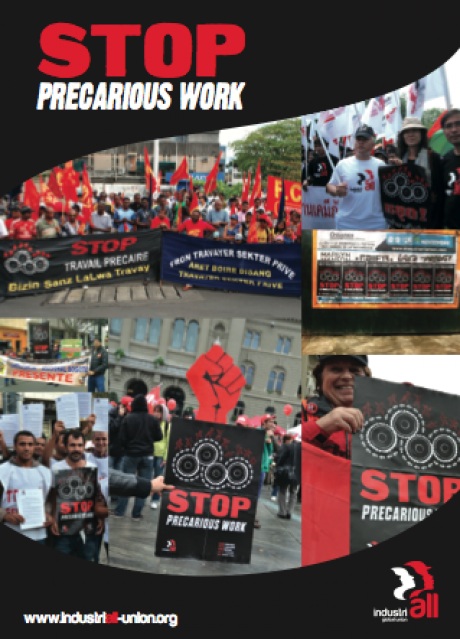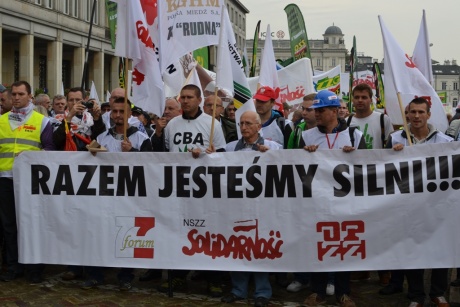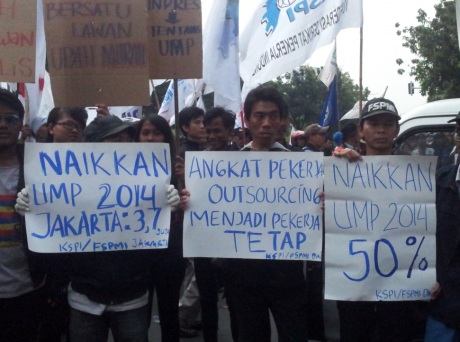| IndustriALL Headlines are produced by IndustriALL Global Union |
 |
September 18, 2013: As preparation for the global action to STOP Precarious Work moves full steam ahead, German unions set a new benchmark for agency worker wages.
IG Metall, member of the German trade union center DGB and an affiliate of IndustriALL, celebrates a remarkable victory in bringing better payment to agency workers. On 16 September in Berlin, the DGB Wage Committee concluded an agreement with two employers’ associations IGZ and BAP. The agreement brings increases in the monthly pay for temporary workers. As of 1 January 2014 their pay will rise in three steps by a total of 9.6 per cent in the West Germany and 12.8 per cent in the East, significantly reducing the pay gap between East and West. The agreement, which also prohibits use of temporary workers as strikebreakers, is valid through to 2016.
Helga Schwitzer, Member of the Executive Board of IG Metall, comments on the achievement, “With the secure and improved newly negotiated collective agreement, and in particular the minimum wage of 8.50 euros, we significantly improve the income situation for temporary workers in Germany.”
At the same time Schwitzer emphasizes that, “The collective agreement for temporary workers is not a panacea. The IG Metall union cannot completely solve the problem of unfair agency work through collective agreements, neither the general abuse, nor the lack of minimum wages in many industries. A special policy is required to deal with the problem.”
Schwitzer continues, “Such a policy must not be vague, but must contain clear legal regulations regarding the abuse of temporary work.” IndustriALL is calling on all affiliates to join the global fight against precarious work by taking action on October 7, the World Day for Decent Work. All updates and campaign materials are available on the STOP Precarious Work campaign page http://www.industriall-union.org/stop-precarious-work.
Follow us on Twitter @IndustriALL_GU and share your messages about actions and success in the global campaign to STOP Precarious Work by hash tagging them #STOPrecariousWork.
September 19, 2013: All plants of the German auto manufacturer Volkswagen worldwide are unionised and have a Workers’ Representative System. Efforts are turned to the only outstanding plant in Chattanooga, Tennessee.
The delegates of these bodies are members of the Volkswagen World Works Council. This body meets once a year to discuss international issues and management regularly reports to the meeting on the international policy of the company.
Only the Volkswagen plant in Chattanooga US is not unionised yet.
But for some time the UAW (the American Autoworkers Union) and the German Works Council at Volkswagen have been working closely together on how to unionise the plant and create a workers representative body at the Volkswagen plant in Chattanooga US.
In the US a works council can be created only with an agreement with of the union.
“VW workers in Chattanooga have the unique opportunity to introduce this new model of labour relations to the United States, in partnership with the U.A.W.,” Bob King, president of UAW said.
Volkswagen and U.A.W. officials met in Germany in August to continue previous discussions on how to cooperate in establishing such a system.
Volkswagen has a long tradition in cooperating with unions and the Works Council and therefore Volkswagen has agreed to not oppose any unionisation drive in their plants.
This is a good example in cooperating between different unions to support each other in organising non-unionised plants.
IndustriALL Auto Sector Director Helmut Lense stated:
“In the annual meeting of IndustriALL’s Automotive Working Group we are discussing such possibilities of mutual support and Volkswagen is not the only example. The colleagues at Mercedes, Volvo, the Japanese Automobile Workers Federation (JAW), colleagues from Ford and GM and others are building networks to support their colleagues in plants far from the headquarters. That is the way to strengthen unions worldwide and to improve working conditions and workers’ rights.”
 |
September 13, 2013: IndustriALL Global Union’s affiliated trade unions in Poland are central actors in the national days of protest in Warsaw of 11–14 September. The days of protest were prepared by Poland’s three largest trade union confederations: Trade Unions Forum (FZZ), the All-Poland Alliance of Trade Unions (OPZZ) and the NSZZ “Solidarnosc”.
The three key demands of the mass mobilizations are:
The protests are expected to be the largest in Poland since 1989.
The three trade unions confederations’ joint demand from the government is for the withdrawal from the Sejm (lower house of Parliament) of a government-led draft legislation on flexible working time. All Polish unions oppose what they call “junk” employment contracts, temporary contracts suited to casual labour that limit employment rights, and also call for a higher minimum wage. Unionists also want more support for certain types of industry and changes to the healthcare system.
They are also protesting against the increase of the retirement age to 67 for both men and women.
Polish Unions do not protest solely on the interests of employees. They want obligatory nationwide referendums on policies once 500,000 signatures have been collected, increased democracy and social policies.
Unions want job security and contracts that guarantee health care and retirement benefits at a time when unemployment is at 13 percent and many companies offer short-term contracts without social security. Unionists say that the Polish work time per week is among the longest in Europe, while average monthly wages are the smallest. Average wages in Poland are 3,700 zlotys ($1,150) before tax.
The current protest is the result of previous actions of unions. On June 26, FZZ, Solidarity and OPZZ walked out of the Tripartite Commission meeting, which was attended by Prime Minister Donald Tusk. The trade unions demanded the dismissal of Labour Minister W?adys?aw Kosiniak-Kamysz and a retraction of the already adopted amendment to the labour code increasing the work time settlement period to one year, which had been sent to the president for signature.
On the first day of the protest, September 11, the unionists picketed outside the buildings of eight ministries: the Treasury, Labour, Transport, Economy, Health, Interior Affairs, Agriculture and Justice. PZZ “KADRA”, Solidarity, ZZG and other IndustriALL member unions picketed the Ministries of Economy.
Later they marched to the parliament building to stage a joint manifestation there. On September 12-13 there debates are being conducted with experts. They will be about the health service, the education system, industrial policy, social policy and the labour market. IndustriALL members oppose the climate policy, precarious work, changes in retirement age and working time.
Organizers estimated some 23,000 attended the mass protest at the start of the four-day demonstration. The protests will culminate on Saturday with some 100,000 people expected to join the demonstration in various locations around the Polish capital.
September 19, 2013: On 8 September, 10 unions in Swaziland successfully came together in a merger to form Amalgamated Trade Unions of Swaziland (Atuswa) building greater unity amongst workers in the manufacturing sector.
The merger included IndustriALL affiliates, the Swaziland Amalgamated Trade Unions (Satu); Swaziland Manufacturing and Allied workers Unions (Smawu) and the Swaziland Processing, Refinery and Allied Workers Union (Sprawu). Atuswa represents workers in textile, garment, metalworkers, engineering, mining and quarrying as well as retail, hospitality and catering
The merger took forward a resolution of the newly merged federation, the Trade Union Congress of Swaziland (Tucoswa) to reduce its affiliates from 28 to 3 through merger processes. The merger process has been supported by the National Union of Metalworkers of South Africa (Numsa) that has been working with the unions for over a year towards the merger. The process was also supported by IndustriALL and received solidarity support from other countries.
The congress adopted a progressive constitution that has key elements of worker control and accountability. Delegates mandated Atuswa to take forward key demands at the workplace and to engage stakeholders in the country including government to establish a minimum wage and a ban on labour brokers.
The merger congress took place at the same time as the annual global week of action for democracy in Swaziland. Failure to get any of the planned actions off the ground including a panel organized by ITUC to hear experiences of workers, which were suppressed by the government and emphasized the need for unity amongst workers and continued solidarity support in Swaziland.
 |
September 16, 2013: 30,000 workers demonstrated against new presidential regulations in front of the State Palace in Jakarta, demanding a wage increase of at least 50% for 2014. There were also protests in Bandung, Cinahi and Subang.
The mass rallies on 5 September in Jakarta come as a response to increased living costs after the Indonesian government increased the fuel price. While the government has suggested a maximum increase of the current minimum wage of 20%, trade unions are demanding that it is at least doubled in order to maintain purchasing power.
There are fears that the new regulation is a return to a regime of cheap labour, with Indonesian workers’ salaries already being below the average salaries in neighboring countries such as Malaysia and Thailand.
Trade unions also demand a mandatory health insurance for everyone as of January 2014. The government plans a gradual implementation ending in 2019, which is slammed by unionists as too slow.
The trade union movement in Indonesia face another challenge related to the new law on Mass Organization and the National Security Act. As the new legislation limits the rights of freedom of association, it also cuts short future rallies and demonstrations.
Indonesian trade unions vow to “continue the struggle until the government withdraws the new regulation about minimum wage”.